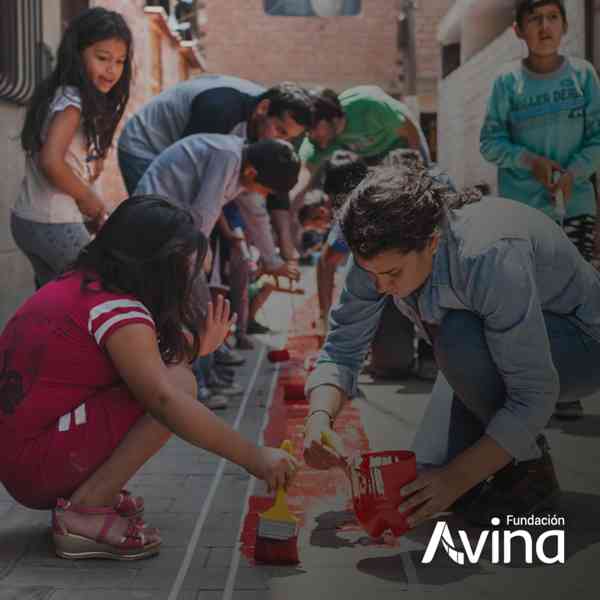Creating Systemic and Resilient Changes for Global Sustainability from the Global South
Fundación Avina's mission is to drive collaborative processes that bring about systemic changes in favor of human dignity and care for the planet. We work from the global South to advance innovations in three strategic areas: Democratic Innovation, Climate Action, and Just and Regenerative Economy.
Description
Fundación Avina's mission is to drive collaborative processes that bring about systemic changes in favor of human dignity and care for the planet. To fulfill this mission, we work from the global South, in line with the 2030 Agenda of the United Nations, to advance innovations in three strategic areas: Democratic Innovation, Climate Action, and Just and Regenerative Economy.
Collaborative change processes are at the core of our work. Recognizing that it takes a diverse coalition of actors to drive the kind of systemic change that advances sustainability, we foster alliances among our partners to promote large-scale impact that no one sector, government, or organization could achieve alone. Over its 25-year history, Fundación Avina has identified, incubated, and supported collaborative alliances, innovative social initiatives and new business models centered on creating opportunities for creating systemic change.
Founded in Latin America, Fundación Avina is a key organization in the region, as it combines a global perspective and reach with a regional presence that extends to the local level. To address the gap between collective strategy formulation and execution that is common among multi-stakeholder collaborations, Fundación Avina serves as a backbone organization for improving transnational coordination and knowledge sharing between partners.
Our work on disaster risk reduction and the building of resilient societies includes: improving the quality of life in South Americas largest biomes; promoting inclusive recycling systems and circular economy; strengthening inclusion and resilience strategies for sustainable cities; ensuring sustainable access to safe water; promoting democratic innovation; among others.
Did the Sendai Framework change or contribute to changes in your activities/organization? If so, how?
The Sendai Framework for Disaster Risk Reduction proposed a broader and more people-centred preventive approach to disaster risk. It calls for multi-hazard, multisectoral, and inclusive disaster risk management processes where coordination is key in the design and implementation of policies, plans and standards. Moreover, the need for the public and private sectors and civil society organizations, as well as academia and scientific and research institutions, to work more closely together and to create opportunities for collaboration is particularly highlighted. At Fundación Avina, we take collaboration to heart and we try to foster it in line with the calls by the Sendai Framework.
What led you to make this commitment/initiative?
What was your position before making this Voluntary Commitment / prior to the Sendai Framework?
We are motivated by the opportunity to enhance collaboration among people and groups at the local level so that they can more actively participate in disaster risk management, which is a foundation for sustainable development. Collaborative change processes are the core of our implementation strategy and guiding vision. We promote shared agendas and effective cooperation among entrepreneurs, companies, civil society organizations, academia, and governmental institutions so that, together, they can amplify and coordinate their efforts to tackle some of the toughest challenges facing Latin America and the world.
Deliverables and Progress report
Deliverables
Deliverables are the end-products of the initiative/commitment, which can include issuance of publications or knowledge products, outcomes of workshops, training programs, videos, links, photographs, etc.
This collaborative process involves national governments, networks of local governments, multilateral networks, universities, civil society organizations, and private companies.
The stakeholders involved in water management are community leaders, government agencies with jurisdiction over water resources and water and sanitation services, academic institutions, research and innovation centers, water roundtables and steering committees, private companies with social and water responsibility programs, trade unions, aid agencies, financial institutions that invest in water and sanitation projects, and civil society organizations.
Stakeholders include indigenous and criollo communities located along the river, Fundación para la Gestión e Investigación Regional (FUNGIR), and government agencies with jurisdiction over the watershed – Ejecutiva de la Comisión Trinacional de la Cuenca del Río Pilcomayo, Comisión Regional del Río Bermejo (COREBE-Argentina), Comisión Nacional del Río Pilcomayo – and that provide meteorological data – Servicio Nacional de Meteorología e Hidrología (SENAMHI-Bolivia), Dirección de Meteorología e Hidrología (DINAC-DMH-Paraguay), Servicio Meteorológico (SMN-Argentina), Instituto Nacional de Tecnología Agropecuaria (INTA-Argentina).
Stakeholders involved in defining urban public policies to promote resilience include community organizations working in areas on the outskirts of cities, citizen movements and networks, the private sector, and governments.
Recycler organizations (associations and cooperatives, national movements, and regional networks), consumer goods companies, municipal and national governments, international cooperation agencies (IDB, IDB Lab, CAF, GIZ, UNDP), experts, journalists, and media outlets work together on this agenda.
Energy issues concern universities, energy users, chambers of commerce, petroleum companies, technical entities, utility companies, energy distributors, environmental organizations, regulatory bodies, and national and local governments.
The new normal requires systemic transformations, and systemic changes are only possible when there is long-term effective collaboration among different actors working together towards a shared vision of the future.
Organizations and focal points
Implementing Organization(s)
Focal points
Partners
- National Endowment for Democracy
- Luminate
- Laudes Foundation
- Inter-American Foundation
- Instituto Iguá
- Institute for Climate and Society
- Gobierno de la Provincia de Salta
- Global Alliance for Banking on Values
- Fundación Gonzalo Río Arronte
- Fundacion Dinero y Conciencia
- EcoSocial
- Dow
- Danone Ecosystem Fund
- EMAC EP
- Comunidad Empresaria
- Comisión Nacional de Microcrédito
- ARBUSTA
- ambev
- The Walmart Foundation
- Ministerio de Educación - Argentina
- Oak Foundation
- Nestlé
- The Coca-Cola Company
- Microsoft
- The Ford Foundation
- PepsiCo
- Green Climate Fund
- Citi Foundation, Citigroup
- European Union
- United Nations Human Settlements Programme (UN-HABITAT) - Headquarters
- United States Agency for International Development (USAID)
- Inter-American Development Bank (IDB)
- Deutsche Gesellschaft für Internationale Zusammenarbeit
- International Development Research Center
- Andean Development Corporation
